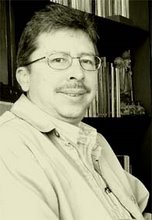Monday, May 28, 2007
By Harold Segura
I was told that on Monday I would participate in the Eucharistic celebration as the reader for one of the scripture passages, but even last night this had not been confirmed. Anyway, I got prepared for the event. I got up earlier than usual (despite the inclement cold), I opened the window to see nothing but the fog, I prepared my dark blue suit, brushed my shoes, adjusted the necktie knot, took breakfast quickly and made off towards my duty. With a sacristan’s pause I walked down the two-hundred-meter ramp leading from the square of the Old Church to the Basilica of Our Lady. This walk can even be a spiritual experience, as long as the sun rises, the birds sing and you can see the majestic dome of Aparecida on the horizon. But today’s cold couldn’t make this anything more than a sacrifice for unity. On the way I found Fr. Efraín Martínez Delgado (Mexico), in charge of coordinating the liturgy during these days, who confirmed my participation and thanked me beforehand.
“So what am I supposed to do, Father?”, I asked.
“Oh no, be calm; just read. We’ll meet at the Basilica and I’ll tell you what the passage is,” he answered.
Well, I said to myself, a reading is just a reading and I have experience. Just tune up my voice (I am betrayed by cough every once in a while), look attentively at the text (my bi-focal glasses can deceive me), do it with the well-known priestly pause (no dramatizing, no Protestant accent) and lift up my eyes from time to time (this I learned in Seminary). Haven’t I been a teacher of Homiletics and taught how to read in public?, I continued to reflect.
A few minutes before the mass began, Fr. Martínez told me not to use my book of Liturgical Celebrations, the red 647-page book we had been given the first day. You will find the book on the lectern, he said, open on the page of the scripture text corresponding to today’s mass. Well, all I did before performing my duty was to read the appointed passage and review the general order of the liturgy. First surprise: this mass is celebrated in the honor of Our Lady of Guadalupe. Second surprise: the text I’m supposed to read is from a deuterocanonical book, Ecclesiasticus (Sirach) 24:23-31. Third surprise: at the end of the reading I have to say “The Word of God.” What will my evangelical brothers and sisters say when they see me on TV? Hopefully the joy of seeing me on the screen (because there still are some who rejoice at these small things) will hide from them the fact that I’m reading from the Apocrypha… or hopefully they will mistake Ecclesiasticus for Ecclesiastes. We’ll see, I said, calling on the help of the Holy Spirit.
The mass started at 8:00 a.m. The celebrant was Bishop Carlos Aguiar Retes (Mexico) with two other bishops, Jorge Enrique Jiménez Carvajal (Colombia) and Adalberto Martínez Flores (Paraguay). The choir with more than one hundred voices was, as always, perfectly tuned; the TV people again on their positions; the Cardinals in front, in the first concentric circle, the Bishops in the second, then the laypeople, the experts, the religious brothers and sisters and the observers in the third. When my turn came, I read.
At the end, at 8:50 a.m., when the liturgy was over, the first person to come and greet me was Fr. Víctor Manuel Fernández, Vice-Dean of the Faculty of Theology of the Catholic University of Argentina, UCA. “I realized it already—you did a big ecumenical effort in reading from a deuterocanonical book and saying at the end, ‘The Word of God.’” Once at the Assembly, Cardinal Giovanni Battista Re, also a President of this Conference, approached me to say thank you for the reading.
“You did it very well,” he said with his always kind Italian smile.
“But Your Eminence,” I said, “this was a trap to me!” And I explained to him what had happened, in case he hadn’t noticed.
So now let me explain what really happened. I am entitled to lawful defense. How can I explain to my evangelical family this “Word of God” tag applied to one of the Apocrypha? Well, this is something I also learned when I was a teacher of Homiletics (being a teacher has to be of some use). When an affirmative sentence is read with a slight elevation of the intonation at the end of the last word, the affirmation becomes an interrogation. So I didn’t say “The Word of God”, but “The Word of God?”. And it’s not my fault if, to my question, everybody responded, “We praise you, Lord.”
Cardinal Giovanni Battista Re, was this a trap to me? Or was this my trap to you? All for the sake of unity! We praise you, Lord.
Harold
martes, 29 de mayo de 2007
 THE WORD OF GOD? WE PRAISE YOU, LORD
THE WORD OF GOD? WE PRAISE YOU, LORD
Suscribirse a:
Enviar comentarios (Atom)


No hay comentarios:
Publicar un comentario